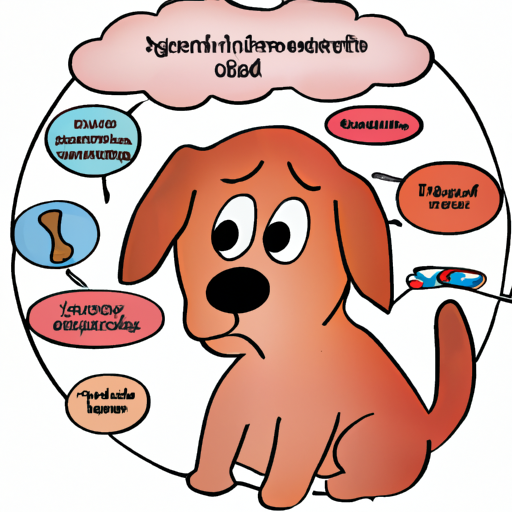As a caregiver, you’re always on the lookout for potential health issues in your furry friends. Stomach ulcers in dogs can be one such problem. Understanding the causes, symptoms, and treatment for this condition will arm you with the knowledge you need to keep your pet healthy and happy.
1. Understanding Stomach Ulcers in Dogs
Stomach ulcers, also known as gastric ulcers, are open sores that develop on the inner lining of your dog’s stomach. When the stomach’s protective lining is damaged, it exposes the sensitive tissues beneath to stomach acids, causing painful ulcers.
2. Causes of Stomach Ulcers in Dogs
There are numerous potential causes for stomach ulcers in dogs. Here are the most common:
- Medications: Nonsteroidal anti-inflammatory drugs (NSAIDs) and corticosteroids, common medications used in dogs for pain relief or to combat inflammation, can potentially cause ulcers if used for prolonged periods.
- Stress: Dogs undergoing significant stress, due to illness or surgery, may develop ulcers.
- Disease: Certain diseases, like kidney disease or liver disease, can lead to ulcer development.
- Poisons or toxins: Ingesting certain toxins, like rat poison or certain plants, can cause ulcers.
- Foreign objects: If your dog swallows a foreign object, it can cause physical trauma to the stomach lining, resulting in an ulcer.
3. Symptoms of Stomach Ulcers in Dogs
Some dogs may show no signs of having an ulcer until it becomes severe. However, if you notice any of the following symptoms, it’s essential to seek veterinary assistance immediately:
- Vomiting (with or without the presence of blood)
- Dark, tar-like stools
- Loss of appetite
- Weight loss
- Weakness and lethargy
4. Diagnosing and Treating Stomach Ulcers
The diagnosis of a stomach ulcer usually involves a physical examination, blood tests, and possibly an ultrasound or endoscopy. Once diagnosed, treatment usually involves:
- Discontinuing any medications that may be causing the ulcer
- Administering medications to reduce stomach acid and protect the stomach lining
- Feeding a bland diet to help the stomach heal
- In severe cases, surgical intervention may be necessary
Table 1. Typical Treatment Plan for Dogs with Stomach Ulcers
| Treatment Steps | Description |
|---|---|
| Stop offending medications | If NSAIDs or corticosteroids are the likely cause, these will be discontinued. |
| Medications | Drugs such as H2 blockers, proton pump inhibitors, or sucralfate may be prescribed. |
| Dietary changes | A bland diet, high in fiber and low in fat, can assist in healing. |
| Surgery | In rare cases, if the ulcer is severe or causing a blockage, surgery may be needed. |
5. Preventing Stomach Ulcers in Dogs
Prevention is always better than cure. Here are some strategies to prevent stomach ulcers in dogs:
- Limit the use of NSAIDs and corticosteroids
- Provide a balanced, healthy diet
- Regular vet check-ups to monitor overall health
- Keep harmful toxins and foreign objects out of your pet’s reach
Frequently Asked Questions
1. Can stomach ulcers in dogs be fatal?
Yes, if left untreated, stomach ulcers can lead to life-threatening complications, like perforation of the stomach or severe bleeding.
2. Can diet cause stomach ulcers in dogs?
While diet itself doesn’t cause stomach ulcers, certain foods can exacerbate the condition. Foods that are high in fat, spicy, or hard to digest can irritate an existing ulcer.
3. How long does it take for a stomach ulcer to heal in dogs?
The healing process varies depending on the severity of the ulcer and the dog’s overall health. Generally, with proper treatment, ulcers should begin to heal within 2-3 weeks.
By understanding the causes, symptoms, and treatment of stomach ulcers in dogs, you are better equipped to care for your pet. When in doubt, always consult with a trusted veterinarian to provide your pet with the best possible care.



